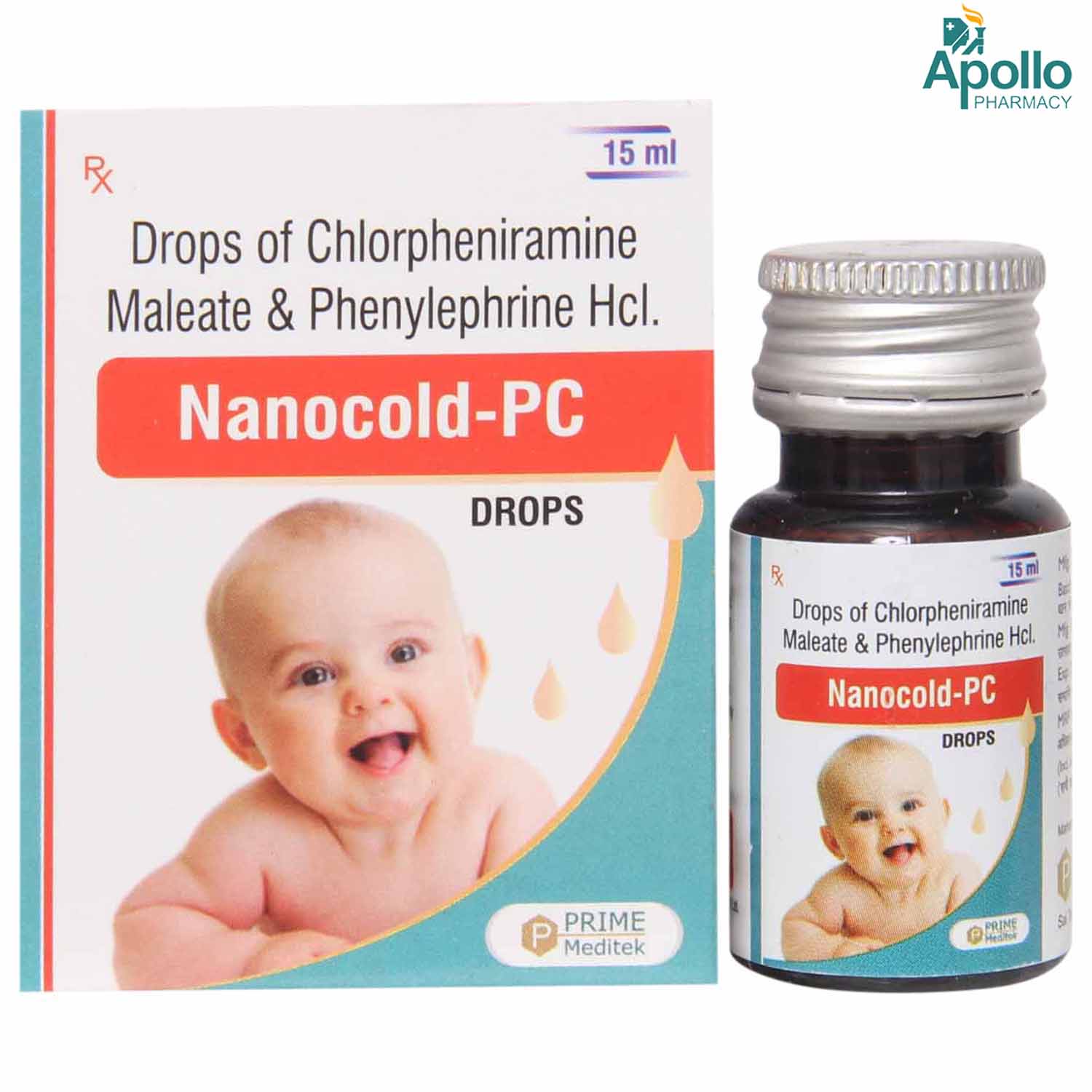Chlorpheniramine
About Chlorpheniramine
Chlorpheniramine belongs to the class of medication called 'sedating antihistamine' or 'anti-allergic' primarily used to treat symptoms of allergies such as itching nose/throat, runny nose, sneezing or red/itchy/watery eyes. An allergy occurs when foreign elements known as allergens attacks and invades our body thereby causing the release of histamine (a chemical messenger) that causes swelling, inflammation, redness, itchiness, watery nose, throat, and eyes.
Chlorpheniramine contains Chlorpheniramine which works by blocking the action of histamine, a substance responsible for causing allergic reactions. It directly acts on the brain and relieves symptoms of allergies by preventing the release of histamine. It helps to provide relief from symptoms of allergy such as sneezing, running nose, watery eyes, itching, swelling, and congestion or stiffness.
Take Chlorpheniramine as prescribed by your doctor. You are advised to take Chlorpheniramine for as long as your doctor has prescribed it for you based on your medical condition. Some people may experience drowsiness, dizziness, constipation, blurred vision, restlessness, dry mouth, nose or throat. Most of these side effects of Chlorpheniramine do not require medical attention and gradually resolve over time. However, if the side effects persist or worsen, please consult your doctor.
If you are allergic to Chlorpheniramine or any other medicines, please tell your doctor. Please consult a doctor before taking Chlorpheniramine if you are pregnant or breastfeeding. The tablet form is not recommended for children below 6 years, and the syrup form is not recommended for children below 1 year. Avoid using Chlorpheniramine if you have taken medicines such as linezolid, phenelzine, selegiline, rasagiline, isocarboxazid, tranylcypromine and methylene blue injection in the past 14 days. Drive only if you are alert as Chlorpheniramine may cause blurred vision, drowsiness or dizziness. Avoid consumption of alcohol with Chlorpheniramine as it may increase the risk of adverse effects. Drink plenty of fluids while taking Chlorpheniramine to protect yourself from being dehydrated or overheated during exercise and in hot weather as Chlorpheniramine decreases sweating and increases the risk of heatstroke.
Uses of Chlorpheniramine
Medicinal Benefits
Chlorpheniramine contains Chlorpheniramine, an antihistamine (anti-allergic drug) that works by blocking the action of histamine, a substance responsible for causing allergic reactions. Thus, it helps provide relief from allergy symptoms such as sneezing/runny nose, red/itchy/watery eyes, throat swelling, itchy throat, and congestion or stiffness.
Directions for Use
Storage
Side Effects of Chlorpheniramine
- Drowsiness
- Dizziness
- Constipation
- Blurred vision
- Restlessness
- Dry mouth
- Dry nose
- Dry throat
Drug Warnings
Please consult a doctor before taking Chlorpheniramine if you are pregnant or breastfeeding. The tablet form is not recommended for children below 6 years, and the syrup form is not recommended for children below 1 year. Avoid using Chlorpheniramine if you have taken antidepressants medicines such as linezolid, phenelzine, selegiline, rasagiline, isocarboxazid, tranylcypromine and methylene blue injection (for diagnosis) in the past 14 days. If you have high blood pressure, fits, glaucoma, chronic bronchitis, asthma, cough with mucus, cough caused by smoking, chronic bronchitis or emphysema (a lung condition causing shortness of breath), chronic obstructive pulmonary disease (COPD), blockage in stomach or intestines, phenylketonuria (a congenital disability that causes accumulation of amino acid, phenylalanine in the body), enlarged prostate, pheochromocytoma (tumour in the adrenal glands), kidney, liver, heart or urinary problems, inform your doctor before taking Chlorpheniramine. Drive only if you are alert as Chlorpheniramine may cause blurred vision, drowsiness or dizziness. Avoid consumption of alcohol with Chlorpheniramine as it may increase the risk of adverse effects. Drink plenty of fluids while taking Chlorpheniramine to protect yourself from being dehydrated or overheated during exercise and in hot weather as Chlorpheniramine decreases sweating and increases heatstroke risk.
Drug Interactions
Drug-Drug Interaction: Chlorpheniramine may interact with anti-allergic drugs (diphenhydramine, cetirizine), antidepressants (duloxetine), anticonvulsants (phenytoin), antianxiety drug (alprazolam).
Drug-Food Interaction: Chlorpheniramine may interact with alcohol. Therefore, avoid consumption of alcohol with Chlorpheniramine as it may increase the risk of adverse effects such as drowsiness, dizziness or difficulty in concentrating.
Drug-Disease Interaction: If you have high blood pressure, fits, glaucoma, chronic bronchitis, asthma, cough with mucus, cough caused by smoking, chronic bronchitis or emphysema (a lung condition causing shortness of breath), chronic obstructive pulmonary disease (COPD), blockage in stomach or intestines, phenylketonuria (a birth defect that causes accumulation of amino acid, phenylalanine in the body), enlarged prostate, pheochromocytoma (tumour in the adrenal glands), kidney, liver, heart or urinary problems, inform your doctor before taking Chlorpheniramine.
Drug-Drug Interactions Checker List:
Safety Advice

Alcohol
unsafeAvoid consumption of alcohol with Chlorpheniramine as it may increase the risk of adverse effects such as drowsiness, dizziness or difficulty in concentrating. Please consult a doctor before consuming alcohol with Chlorpheniramine.

Pregnancy
cautionChlorpheniramine is a category B pregnancy drug and is given to pregnant women only if the doctor thinks it is essential. Please consult a doctor if you are pregnant.

Breast Feeding
cautionChlorpheniramine is given to breastfeeding women only if the doctor thinks benefits are greater than risks. Please consult a doctor if you are breastfeeding.

Driving
cautionChlorpheniramine may cause blurred vision, drowsiness or dizziness in some people. Therefore, drive only if you are alert and vision is clear after taking Chlorpheniramine.

Liver
cautionTake Chlorpheniramine with caution, especially if you have a history of Liver diseases/conditions. The dose may be adjusted by your doctor as required.

Kidney
cautionTake Chlorpheniramine with caution, especially if you have a history of Kidney diseases/conditions. The dose may be adjusted by your doctor as required.

Children
cautionThe syrup form is not recommended for children below 1 year, and the tablet form is not recommended for children below 6 years as the safety and effectiveness were not established. Please consult your doctor for more information.
Habit Forming
Diet & Lifestyle Advise
- Wash your hands with soap and water regularly to prevent the spread of germs.
- Eat plenty of foods rich in good bacteria like yoghurt to improve overall health.
- Drink plenty of fluids to avoid dehydration.
- Gargle with salt water for relief from sore throat.
- Avoid consumption of alcohol with Chlorpheniramine as it may cause tiredness, drowsiness or lack of concentration.
Special Advise
- If the symptoms persist or worsen after using Chlorpheniramine for 1 week, please consult a doctor.
- Do not use Chlorpheniramine in children under 6 years of age to relieve cough and cold symptoms.
- If you have used any MAO inhibitors or anti-depressant pills like Isocarboxazid, Phenelzine, Selegiline, or Tranylcypromine in the last 14 days, do not take Chlorpheniramine.
Patients Concern
Disease/Condition Glossary
Allergies: These occurs when foreign elements known as allergens attacks and invade our body, thereby causing the release of histamines. This chemical messenger 'histamine' causes swelling, inflammation, redness, itchiness, itchy/watery nose and throat, and watery eyes. Allergies generally occur due to chemicals, air pollution, pet danders, dust, pollen hairs, seasonal allergies like hay fever etc.
FAQs
Chlorpheniramine contains Chlorpheniramine, an anti-allergic drug that works by blocking the action of histamine, a substance responsible for causing allergic reactions. Thereby, helps to provide relief from symptoms of allergy such as sneezing, running nose, watery eyes, itching, swelling, and congestion or stiffness.
Chlorpheniramine may cause dry mouth as a temporary side effect in some people. It is not necessary for everyone taking Chlorpheniramine to experience this side effect. However, to avoid such side effects, drink plenty of water, regularly rinse your mouth, practice good oral hygiene and suck on sugarless candy. However, if the condition persists or worsens, please consult a doctor.
You are not recommended to take Chlorpheniramine with alprazolam or any other antipsychotics pills as co-administration of these two medicines may increase adverse effects such as drowsiness, confusion, dizziness and difficulty in concentrating. Please consult a doctor before taking Chlorpheniramine with any other medicines.
You are recommended to take Chlorpheniramine for as long as your doctor has prescribed it. However, if the symptoms persist or worsen with rash, fever or persistent headache after 1 week of using Chlorpheniramine, please consult your doctor.
You recommend avoiding taking Chlorpheniramine if you have asthma, eye problems like glaucoma, enlarged prostate gland, urinary problems, blockage in stomach or intestines. However, if you have any of these conditions, please inform your doctor before taking Chlorpheniramine.
Chlorpheniramine may be used to treat allergic reactions caused by insect bites. Chlorpheniramine blocks the action of histamine, a substance responsible for causing allergic reactions. Thereby, helps to provide relief from allergic symptoms. However, please consult a doctor before using Chlorpheniramine.











